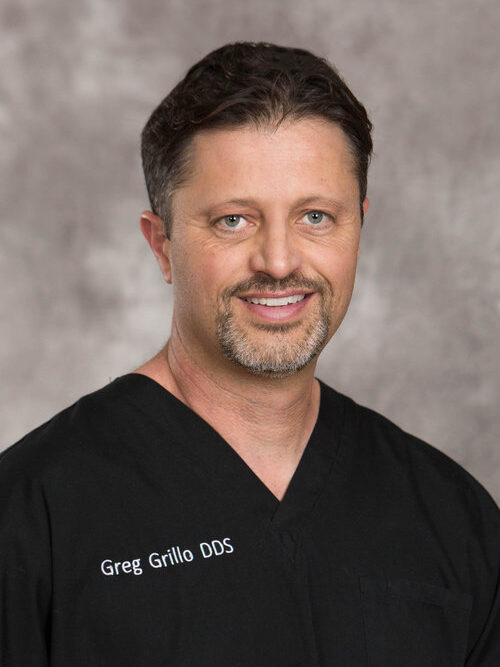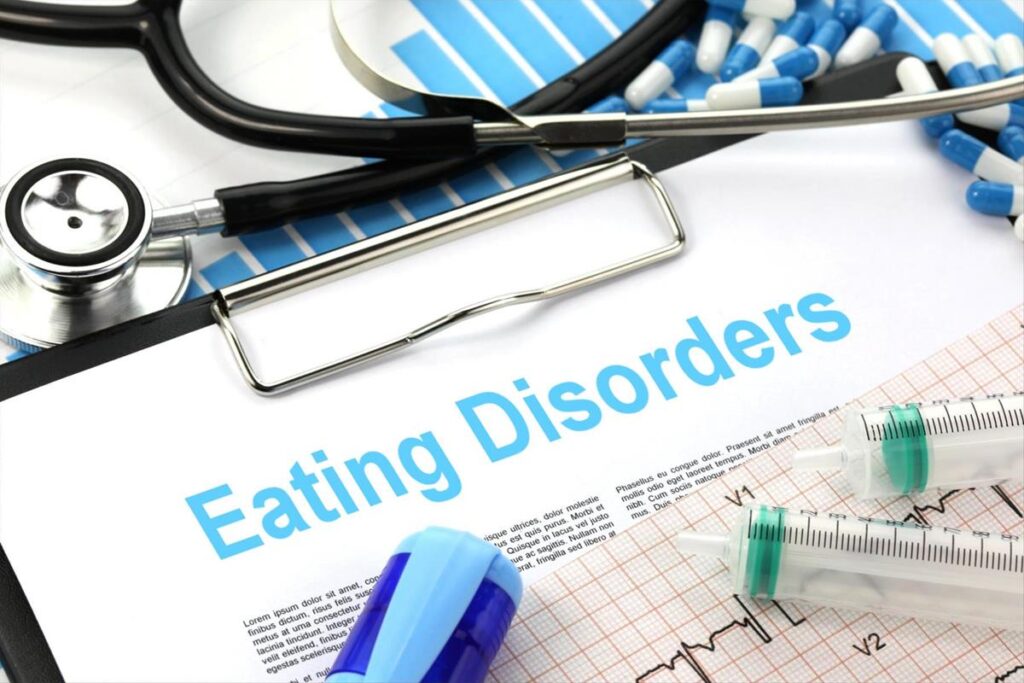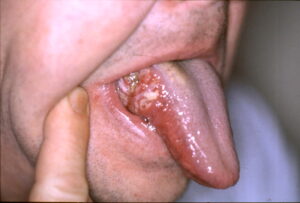Chances are you know someone with an eating disorder or you’ve dealt with an eating disorder yourself. Anorexia and bulimia are issues that can cause some very significant problems for people. But a lot of times, people are good at hiding that disease from others. The one person that you can’t hide it from though is a dentist, especially if you’re having regular exams. That’s because 89% of the people with bulimia end up with signs in their mouth that are indications of damage from stomach acids.
Stomach acids can damage your teeth
Think of stomach acid like battery acid. It is very, very acidic. And you can imagine, if you take acid and you pour it on the concrete, what does it do? It etches away the surface. It damages the surface.
Well, our teeth are a hard mineralized surface, harder than concrete. And if you take acid and expose those teeth to the acid, then the surface starts to break down, the mineral starts to come out. Besides eating disorders, frequent acid reflux can also damage teeth.
Dentists can see the effects of eating disorders in your mouth
What a dentist may see, especially with bulimia, is the effects of the stomach acid on the teeth, especially on the backs of the front teeth and especially on the backs of the lower front teeth because the stomach acid will tend to pool there after vomiting. And so, a dentist may notice that the teeth are getting thinner. They get almost a translucent look over time as the damage accumulates.
Vomiting in people with eating disorders can cause many problems in the mouth
The problem with stomach acid of course being so harsh is that it can lead to this thinning and this damage, but that also makes the teeth more susceptible to cavities especially. And it also makes them more susceptible to sensitivity. So, if someone’s complaining about sensitive teeth and we notice thin enamel, then we may start to suspect an eating disorder.
Of course, stomach acid is also harsh not just on the teeth but on the other tissues of the mouth, the soft tissues of the mouth. You can get mouth sores. You can get cracked lips. You can get sore throat. Different effects from this very, very harsh chemical that does not belong in the mouth. So, this can be a real indication to a dentist that something is going on.
Protecting your teeth from the effects of bulimia
The tips for someone that is dealing with this: We always want to try to help people get support and treatment to overcome these eating disorders. But in terms of oral care, we want to be a little bit careful if someone is dealing with purging and vomiting. The challenge there is if the acid gets on the teeth, obviously it’s going to erode it, but if you start to brush immediately, it’s like an acid scrub. So, if you’re brushing acid against your teeth, it actually accelerates significantly the breakdown of those teeth.
Rinse with baking soda to protect your teeth from stomach acid
So, one thing that a person may do if they’ve just vomited is to take baking soda, just a little bit of baking soda and some water, which is a neutralizer for acid. You can rinse with that for 30 seconds and that will help neutralize that acid very quickly.
Delay brushing after vomiting or purging
Then it would be wise to wait 20 minutes or so before brushing the teeth just to avoid that extra damage that can occur.
Use a fluoride rinse to strengthen your teeth
And then the use of a fluoride rinse, for example, would be wise for many people because the fluoride can help re-mineralize the teeth and can help them, you know, remain strong and a little more resistant. But if there’s an ongoing problem, it’s going to be very difficult for the teeth and the mouth tissue to overcome that.
Anorexia can affect oral health too
Now, with anorexia, if there’s not good nutrient intake, actually with either anorexia or bulimia, but if someone isn’t eating properly, then they may not be getting the right vitamins and minerals. That can also have an effect on the tissues of the mouth and make them more fragile. It can also lead to problems with the bone quality and even accelerate bone loss because of the lack of intake of calcium, for example. (If you don’t have an eating disorder, read about some other causes of bone loss in the jaw).
So, obviously these are very serious disorders for many reasons, but from a dental perspective, there are some serious problems that can occur and people can lose their teeth or at a minimum have very significant amounts of dentistry that are required in order to repair the damage.
It’s important to get treatment for your eating disorder, but in the meantime, read some tips on how to strengthen teeth.
Getting help for eating disorders
At Express Dentist, we have a trusted network of dentists that can help you, no matter what you have going on. If you have an eating disorder, or you have a loved one that has an eating disorder, a lot of times the dentist is the first one to actually be able to step in and provide some guidance and to identify what’s going on. So, even if you suspect it, if you’re able to get someone to a dentist, they may be able to provide the support that they need to get ongoing help. Then of course the dentist can help with protecting the oral health overall, as a starting point as well.
So, if you need a dentist, please reach out to us at Express Dentist. We have a trusted network of experienced dental providers around the nation. We can help you find somebody that can be a support to you for better oral and overall health. All the best.
About the author

Dr. Greg Grillo
Dr. Greg Grillo DDS studied at the University of Washington where he received a bachelors degree with Honors and later attended dental school on the same campus. Following school Dr. Greg served in the United States Navy as a dental officer. During this time he received advanced training in specialty areas of dentistry while also treating families of members of the military.
As well as sharing valuable information on dentistry and oral health, Dr. Greg remains a practicing dentist to this day. He works with families in the Okanogan Valley where he lives with his wife and three children.
- Dr. Greg Grillo
- Dr. Greg Grillo
- Dr. Greg Grillo
- Dr. Greg Grillo
- Dr. Greg Grillo
- Dr. Greg Grillo
- Dr. Greg Grillo
- Dr. Greg Grillo
- Dr. Greg Grillo
- Dr. Greg Grillo
- Dr. Greg Grillo
- Dr. Greg Grillo
- Dr. Greg Grillo
- Dr. Greg Grillo
- Dr. Greg Grillo
- Dr. Greg Grillo
- Dr. Greg Grillo
- Dr. Greg Grillo
- Dr. Greg Grillo
- Dr. Greg Grillo
- Dr. Greg Grillo
- Dr. Greg Grillo
- Dr. Greg Grillo
- Dr. Greg Grillo
- Dr. Greg Grillo
- Dr. Greg Grillo
- Dr. Greg Grillo
- Dr. Greg Grillo
- Dr. Greg Grillo
- Dr. Greg Grillo
- Dr. Greg Grillo
- Dr. Greg Grillo
- Dr. Greg Grillo
- Dr. Greg Grillo
- Dr. Greg Grillo
- Dr. Greg Grillo
- Dr. Greg Grillo
- Dr. Greg Grillo
- Dr. Greg Grillo
- Dr. Greg Grillo
- Dr. Greg Grillo
- Dr. Greg Grillo
- Dr. Greg Grillo
- Dr. Greg Grillo
- Dr. Greg Grillo
- Dr. Greg Grillo
- Dr. Greg Grillo
- Dr. Greg Grillo
- Dr. Greg Grillo
- Dr. Greg Grillo
- Dr. Greg Grillo
- Dr. Greg Grillo
- Dr. Greg Grillo
- Dr. Greg Grillo
- Dr. Greg Grillo
- Dr. Greg Grillo
- Dr. Greg Grillo
- Dr. Greg Grillo
- Dr. Greg Grillo
- Dr. Greg Grillo
- Dr. Greg Grillo
- Dr. Greg Grillo
- Dr. Greg Grillo
- Dr. Greg Grillo
- Dr. Greg Grillo
- Dr. Greg Grillo
- Dr. Greg Grillo
- Dr. Greg Grillo
- Dr. Greg Grillo
- Dr. Greg Grillo
- Dr. Greg Grillo
- Dr. Greg Grillo
- Dr. Greg Grillo
- Dr. Greg Grillo
- Dr. Greg Grillo
- Dr. Greg Grillo
- Dr. Greg Grillo
- Dr. Greg Grillo
- Dr. Greg Grillo
- Dr. Greg Grillo
- Dr. Greg Grillo
- Dr. Greg Grillo
- Dr. Greg Grillo
- Dr. Greg Grillo
- Dr. Greg Grillo
- Dr. Greg Grillo
- Dr. Greg Grillo
- Dr. Greg Grillo
- Dr. Greg Grillo
- Dr. Greg Grillo
- Dr. Greg Grillo




